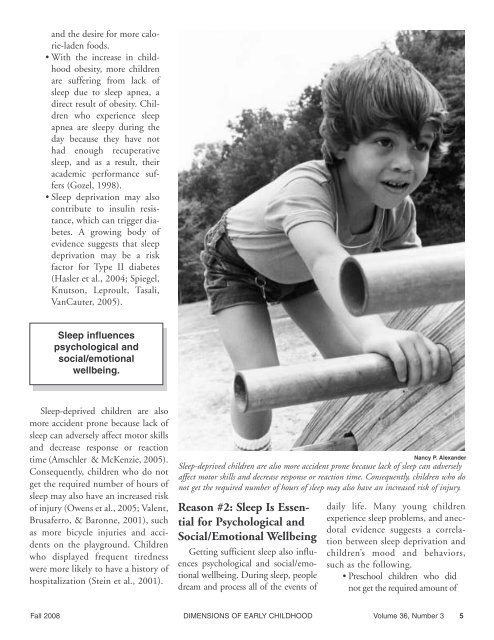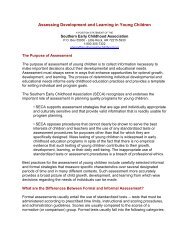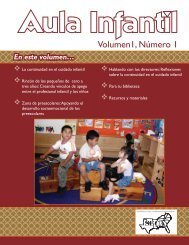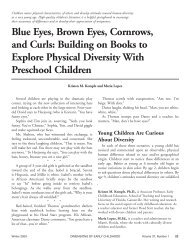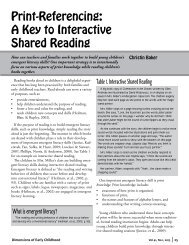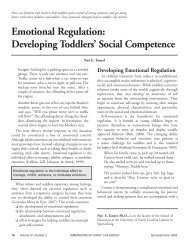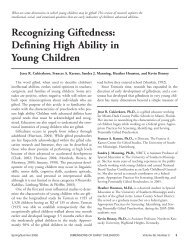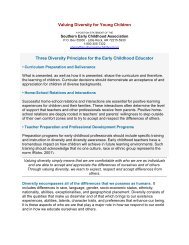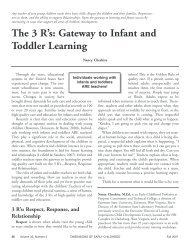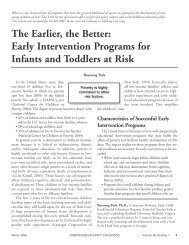Five Essential Reasons to Keep Naptime in the - Southern Early ...
Five Essential Reasons to Keep Naptime in the - Southern Early ...
Five Essential Reasons to Keep Naptime in the - Southern Early ...
You also want an ePaper? Increase the reach of your titles
YUMPU automatically turns print PDFs into web optimized ePapers that Google loves.
and <strong>the</strong> desire for more calorie-laden<br />
foods.<br />
• With <strong>the</strong> <strong>in</strong>crease <strong>in</strong> childhood<br />
obesity, more children<br />
are suffer<strong>in</strong>g from lack of<br />
sleep due <strong>to</strong> sleep apnea, a<br />
direct result of obesity. Children<br />
who experience sleep<br />
apnea are sleepy dur<strong>in</strong>g <strong>the</strong><br />
day because <strong>the</strong>y have not<br />
had enough recuperative<br />
sleep, and as a result, <strong>the</strong>ir<br />
academic performance suffers<br />
(Gozel, 1998).<br />
• Sleep deprivation may also<br />
contribute <strong>to</strong> <strong>in</strong>sul<strong>in</strong> resistance,<br />
which can trigger diabetes.<br />
A grow<strong>in</strong>g body of<br />
evidence suggests that sleep<br />
deprivation may be a risk<br />
fac<strong>to</strong>r for Type II diabetes<br />
(Hasler et al., 2004; Spiegel,<br />
Knutson, Leproult, Tasali,<br />
VanCauter, 2005).<br />
Sleep <strong>in</strong>fluences<br />
psychological and<br />
social/emotional<br />
wellbe<strong>in</strong>g.<br />
Sleep-deprived children are also<br />
more accident prone because lack of<br />
sleep can adversely affect mo<strong>to</strong>r skills<br />
and decrease response or reaction<br />
time (Amschler & McKenzie, 2005).<br />
Consequently, children who do not<br />
get <strong>the</strong> required number of hours of<br />
sleep may also have an <strong>in</strong>creased risk<br />
of <strong>in</strong>jury (Owens et al., 2005; Valent,<br />
Brusaferro, & Baronne, 2001), such<br />
as more bicycle <strong>in</strong>juries and accidents<br />
on <strong>the</strong> playground. Children<br />
who displayed frequent tiredness<br />
were more likely <strong>to</strong> have a his<strong>to</strong>ry of<br />
hospitalization (Ste<strong>in</strong> et al., 2001).<br />
Nancy P. Alexander<br />
Sleep-deprived children are also more accident prone because lack of sleep can adversely<br />
affect mo<strong>to</strong>r skills and decrease response or reaction time. Consequently, children who do<br />
not get <strong>the</strong> required number of hours of sleep may also have an <strong>in</strong>creased risk of <strong>in</strong>jury.<br />
Reason #2: Sleep Is <strong>Essential</strong><br />
for Psychological and<br />
Social/Emotional Wellbe<strong>in</strong>g<br />
Gett<strong>in</strong>g sufficient sleep also <strong>in</strong>fluences<br />
psychological and social/emotional<br />
wellbe<strong>in</strong>g. Dur<strong>in</strong>g sleep, people<br />
dream and process all of <strong>the</strong> events of<br />
daily life. Many young children<br />
experience sleep problems, and anecdotal<br />
evidence suggests a correlation<br />
between sleep deprivation and<br />
children’s mood and behaviors,<br />
such as <strong>the</strong> follow<strong>in</strong>g.<br />
• Preschool children who did<br />
not get <strong>the</strong> required amount of<br />
Fall 2008 DIMENSIONS OF EARLY CHILDHOOD Volume 36, Number 3 5


